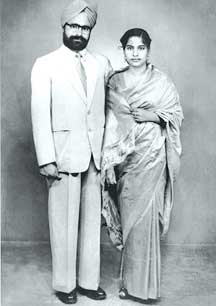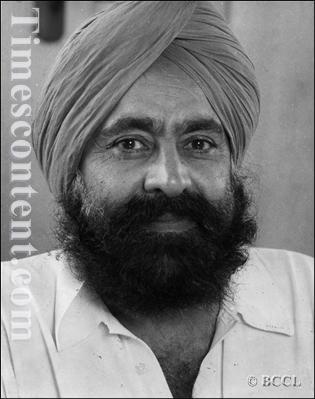 |
Craig White's Literature Courses Critical Sources Guide to Khushwant Singh Train to Pakistan (1956) |
 |
Train to Pakistan is set in 1947, the year of India's partition and independence.
Its setting is a railway town in the Punjab region of the Indian Subcontinent.
The Punjab region, named for its 5 rivers, is historically the "breadbasket" or most fertile region of India. Therefore, when colonial India was divided to Pakistan and India, the historically-unified Punjab region was split between the two new nations.

Today the Punjab is often known as the geographic and cultural home of the Sikh people and religion. The Punjab is also home to many Hindus and Muslims. The portions of the Punjab in India have been home to various separationist movements by Sikh nationalists, a conflict that appears in Bharati Mukherjee's Jasmine. (Pakistan has exploited this tension with cross-border terrorism, and India has reacted with oppressions reminiscent of the British Empire.)
photos of Khushwant Singh (& wife) in Sikh apparel
(Many but not all Sikhs have the surname "Singh,"
which means
"Lion")
|
|
|
Before 1947, however, the Punjab was a multi-ethnic region including Sikhs, Muslims, Hindus, and others.
The 1947 Partition of India was particularly divisive to the Punjab region. West Punjab, the larger section, became part of Muslim-majority Pakistan. East Punjab became part of Hindu-majority India.
As millions of people crossed borders for security, traditional settlements and cultural relations were disrupted. Violence led to rising fear and retribution.
Among cultural issues raised are not only the relations of colony and empire but the identity of nation(s). Modern western peoples take nation or nationality for granted, but is it only a mediation of the global and local? Do "transnational migration" and "multinational corporations" with "global capital" further destabilize the concept?
|
|
|
Notes on Train to Pakistan
characters:
Lal, only Hindu family (money-lenders?)
Sikhs own land, Muslims appear mostly as tenant farmers (class + ethnicity)
Jugga + Nooran as Romeo & Juliet couple
![]() Jugga is a
Sikh bad-boy
Jugga is a
Sikh bad-boy
![]() Nooran is a poor Muslim girl
Nooran is a poor Muslim girl
Malli, leader of dacoits or robbers
Hukum Chand, magistrate & deputy commissioner of district
Iqbal, a social worker of undetermined ethnicity—Iqbal is the representative of modernity: urban, secular, individualized. What attractions and problems to this emerging, conflicted identity?
Uncle Imam Baksh, mullah of local mosque
Movel's opening section is DACOITY, which means "robbery," referring directly to the opening action of a band of dacoits or robbers attacking the home of the Lal family of Hindus. Lal appears to be a money-lender.
Novel's 2nd section: KALYUG: "the dark age" implies apocalyptic millennialism as a
p. 31 For Americans particularly, "making love" is a euphemism for sexual intercourse, but British usage may be less definitive or climactic. Hukum Chand's "love-making" may not indicate that he has had intercourse the teenage singer (though he intended and prepared to). See "make love."
Instructor may add further notes in coming weeks.
![]()



